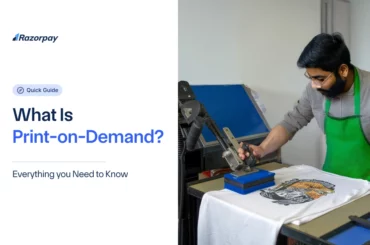In this world, everyone and everything has a story. Whether it’s people, business, or products and services, there is always a story that talks about the subject’s existence, exclusivity, and rise and fall. The best way to become a part of anyone’s story is to connect your story with theirs seamlessly.
Today, in the words of Seth Godin, ‘Marketing is no longer about the stuff that you make, but about the stories, you tell.’ A brand is not remembered by its pitch, variety of offerings, offers, discounts, or even freebies but by the stories. It’s remembered by how strongly the audience connects with a story.
This makes storytelling one of the most important parts of every business’s branding and marketing strategy to grow and accelerate its sales through multiple channels.
What Exactly Is Storytelling and Why Is It Called ‘The Art Of Storytelling’?
Do you remember the way our loved ones would tell us bedtime stories that used to take us to an imaginary world, where we could not only hear the story but also visualize, experience, and feel it? That detailed narration style that makes you connect with the story and feel the emotions involved is called storytelling. It requires imagination, vision, creativity, patience, observation, understanding, and charm; it’s called art and not a skill.
While we’ve been seeing several Thai, South Korean, American, and European examples of brilliant storytelling, here is an exceptional example from Hyundai India telling its story in an extremely heartfelt way;
https://www.youtube.com/watch?v=qSZ4h7YSGnQ
Why Should You Tell A Story?
Stories help to clarify abstract concepts and make complicated messages more understandable and memorable. Right from those bedtime stories in childhood to the case studies in professional life, stories, whether real or fictional, have the power to influence your thinking, impact your personality and enable you to develop the skills that help you make the right decisions in situations that match with the ones in the stories.
As the human brain can easily remember visual memories, stories make it easy for the brain to create visual memories and remember the details. Thus, presenting your brand, products, or services in an engaging story format will make your audience connect to it and remember it.
Check out an amazing example of storytelling that LG used to promote its products without actually promoting them and just by blending them subtly in the story.
https://www.youtube.com/watch?v=O8jHf6cwWB0
How To Develop A Good Story?
Before telling a story, you must also have a story to tell. So, here’s everything you need to create a good story that will help you convey your message in the most engaging, entertaining, and memorable way possible.
Overall, a good story;
- Keeps the reader entertained and curious about what will happen next.
- Piques the reader’s interest and adds to their information bank.
- Is universal in its appeal to all readers and taps into the feelings and perceptions that most people share.
- Has a clear structure that helps you to express the main message and its absorption by the audience.
- Is memorable and leaves an impression on the reader, whether by inspiration, controversy, or satire.
Moreover, three essential elements play the most important role in making a story that will make an impact on the audience and enable you to achieve the prime objective;
Characters: Every story has at least one protagonist who plays a crucial role in keeping the audience connected to the story.
Conflict/Dispute: The part that describes the character overcoming an obstacle is the conflict. The conflict in your story elicits feelings and brings the audience together through shared experiences.
Conclusion: A good story must have a conclusion; it does not always have to be a good conclusion.
Here’s an example of a short but relevant and connecting storytelling by Big Bazaar;
https://www.youtube.com/watch?v=Xvv5pPrBKIE
How To Tell A Story?
Now that you have developed a good story, it’s time to understand the right way to tell the audience, just like ‘The Master Of The Art Of Storytelling.’
Identify Your Target Audience:
No matter how great your story is, telling it to the wrong audience cannot relate to it will be a complete waste of all your efforts. So, before you tell your story to anyone and everyone, it is important to identify the type of people who will relate to it and help you achieve the desired objective.
Choose The Right Medium To Tell Your Story
Stories come in a variety of shapes and sizes. Some stories are read, while others are watched and listened to. So, whether it’s live interaction, written, audio, or video format, the medium of your story is determined by the type of story you’re telling and your available resources, such as time and money.
Give The Central Message:
Whether your story is short or long, it should have a central message. The central message could be anything from the most interesting fact about your brand to a key benefit of your product or service. It is the most important thing that you wish your audience to remember even after the story.
Add A Call-To-Action
A great story without any call-to-action will give you no results. So, never forget to tell your audience the purpose of your story and what you want them to do after the story is over.
Whether to believe in your brand, buy your products and services, become a part of your team, or anything else, having a call-to-action at the end of your story will help you achieve the desired objective.
Here’s how Vogue India perfectly puts its message across via an attention-grabbing example of storytelling;
https://www.youtube.com/watch?v=0Nj99epLFqg&t=104s
While this guide helps you understand the basic details about storytelling and the steps to develop a good story and tell it the best possible way to get the desired results, mastering the art of storytelling is not possible overnight. It requires determination, dedication, observation, constant efforts, and years of hard work.
Today, from marketing to entertainment and education to construction, every industry requires great storytelling artists who can help them tell a story that will increase their sales and enable their business to grow.




![GST State Code List & Jurisdiction 2025 [Updated List] GST State Codes](https://d6xcmfyh68wv8.cloudfront.net/learn-content/uploads/2024/02/GST-State-Codes-370x245.webp)
